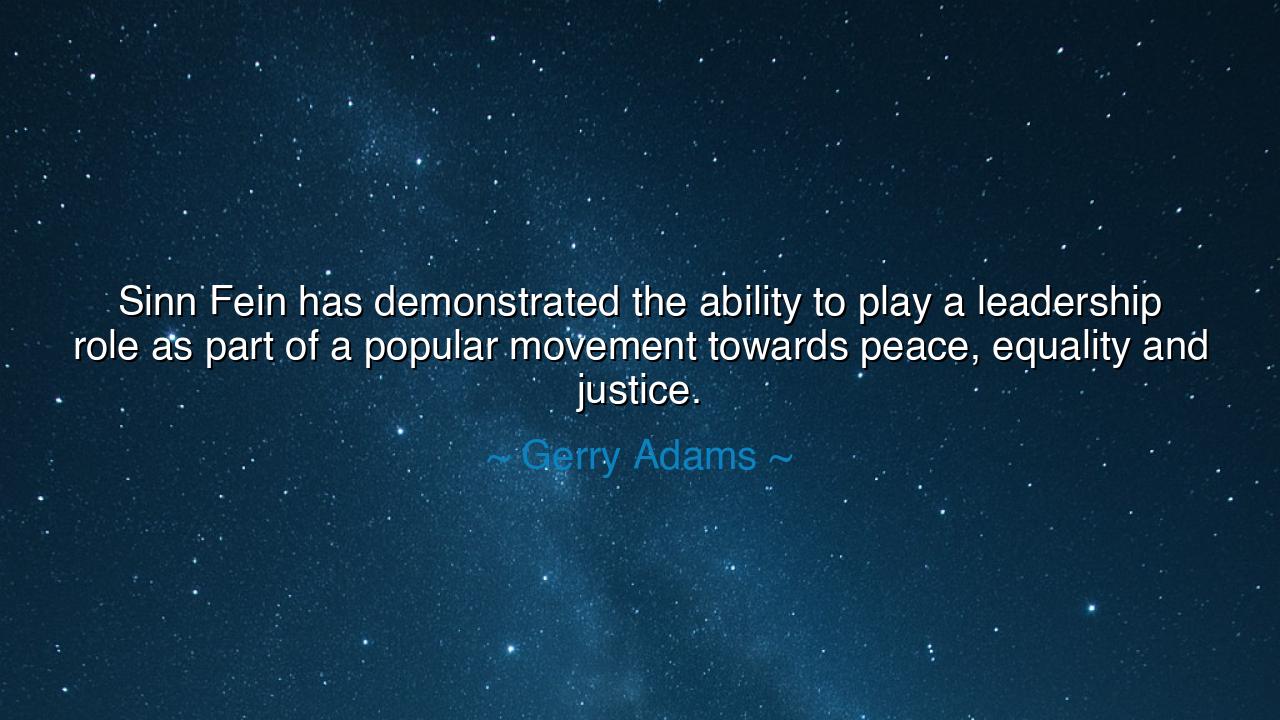
Sinn Fein has demonstrated the ability to play a leadership role
Sinn Fein has demonstrated the ability to play a leadership role as part of a popular movement towards peace, equality and justice.






The words of Gerry Adams—“Sinn Féin has demonstrated the ability to play a leadership role as part of a popular movement towards peace, equality and justice”—echo like the song of a people who have walked through shadow and emerged into light. These words are not merely political; they are the articulation of a centuries-long yearning, a reminder that even in the heart of conflict, there can grow the seeds of renewal. The name Sinn Féin, meaning “Ourselves Alone,” was once the cry of rebellion and national identity. Yet Adams’ reflection shows its evolution—from defiance and division to leadership, unity, and peace. It is the story of a people learning that strength is not only found in the clenched fist but in the open hand extended toward reconciliation.
The meaning of this quote lies in the transformation of purpose. There was a time when the Irish struggle for sovereignty was defined by bloodshed, by the clash of faiths, and by the anguish of divided communities. But Sinn Féin’s leadership in later decades revealed a deeper truth: that peace, when born from conviction, can be stronger than any war. Adams speaks not of dominance, but of moral courage—the ability to guide one’s people through the chaos of history, to show that justice and equality can be achieved not by the sword but by the spirit. Such leadership requires vision, the humility to listen, and the wisdom to transform anger into understanding.
To grasp the full power of Adams’ words, one must remember the Good Friday Agreement of 1998, when the storm of Northern Ireland’s conflict—known as The Troubles—finally began to settle. It was not an act of sudden grace, but of relentless endurance. Men and women on both sides of the divide, weary of funerals and fear, began to see that there was no lasting victory in hatred. Sinn Féin, once viewed as the political arm of resistance, took on a new form—a bridge between enemies, a messenger for peace. That moment, fragile yet profound, was proof that even movements born of fire could be purified by the light of reconciliation.
There is ancient wisdom in this evolution. Every civilization has faced its own division—Athens and Sparta, Rome and Carthage, the clans of Japan, the tribes of Israel. Yet history teaches us that true leadership is not measured by conquest, but by the courage to heal. Adams’ reflection reminds us that peace, equality, and justice are not gifts granted from above; they are the fruits of collective struggle, watered by the patience of generations. The leader who recognizes this truth does not command from a throne, but walks among his people, guiding them toward balance and dignity.
Consider the story of Nelson Mandela, who, like Adams, turned from the path of conflict to the path of reconciliation. Once imprisoned for his defiance, Mandela emerged not to seek vengeance but to build a nation upon forgiveness. His journey mirrors the same transformation of Sinn Féin—from militancy to moral leadership, from grievance to vision. Both stories remind humanity that when a people discover that their shared future is worth more than their divided past, miracles of peace can unfold.
Thus, the origin of Adams’ insight is not political alone—it is human, spiritual, universal. It springs from the eternal struggle between shadow and light within every society, every heart. Peace is not the absence of war; it is the triumph of understanding over ignorance, of compassion over pride. Equality is not sameness; it is the recognition of worth in every soul. And justice is not revenge; it is the restoration of balance to a wounded world. Adams’ words are a mirror, inviting all movements—whether social, religious, or cultural—to reflect upon their true purpose: to lead not by fear, but by hope.
The lesson is timeless: leadership is not the privilege of the powerful, but the responsibility of the awakened. When guided by conscience and compassion, even the most divided communities can rise toward peace. Each generation must become its own Sinn Féin—“ourselves alone”—not in isolation, but in the shared resolve to shape a world where justice and equality are not dreams, but daily realities. Let this be the call to all who hear: seek peace not as an end, but as a way of being; seek justice not as a weapon, but as a promise; and let your leadership, however humble, become part of humanity’s eternal movement toward light.






AAdministratorAdministrator
Welcome, honored guests. Please leave a comment, we will respond soon